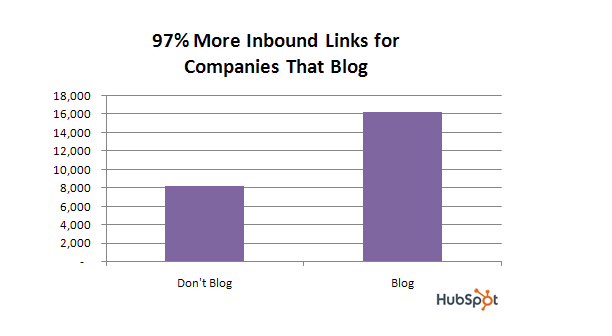13th March 2019

Blogs are often one of the most under valued section of a website. Adding content to them is seen as a chore and they can quickly become dormant and unused. If this is the case with your website’s blog then this needs to be remedied as you could be missing out on traffic, and in turn sales.
An active blog can have a huge impact on your websites SEO and traffic. Below we look at a couple of the reasons why blogging is so important.
Increase search engine traffic
I like to consider every page of a website as a doorway. The more pages you have the more doorways people have to enter your website. For most websites, especially small companies, you wouldn’t be creating new pages regularly, if at all. You are in danger of your site becoming quite static and difficult to find.
Having a blog allows you a fantastic way to produce new pages and content, and is the best way to create appealing new doorways. Which in turn should increase the traffic to your website. Companies that blog receive 55% more traffic than companies that don’t. If your content is good and you have clear CTAs then this increased traffic should soon become increased conversions and enquiries.
It’s a great way to earn external links
Having other websites link back to yours is one of the best ways to improve your SEO, but it is also one of the hardest. Google views links to your site as a sign of authority, expertise and trust. Having a large number of good links has always been an important ranking factor, which in turn led to a lot of link spam back in the day. Google has cracked down, and you can get your website penalised if you try and manipulate the system.
One of the best ways to get more links is to be creative great quality blog content. Have a look at what people are talking about, are there any new trends or technology on the horizon? Think about what people would find useful and construct your blogs around that. If people like it they might share it or write about it on their own site (with a link back to you). A study found that websites with an active blog have on average 97% more inbound links then websites without blogs.

They can help you target long tailed keywords
SEO is really competitive, especially for the keywords with the highest volume. Smaller business will struggle to ever rank well for these top keywords. For example, unless you are one of the biggest clothing brands in the world you will struggle to ever be number one for keywords like “coats” or “jackets”.
A better tactic is to aim for terms or phrases that people are searching for. Half of all searches are four words or longer and targeting these in your content are a great way to start ranking for relevant searches. For example, a small clothing shop could write a blog on “the best 10 winter coats” or “5 jackets that are great in summer”. These kind of phrases are hard to drop into your regular content, but ideal for a blog post.
Target Position Zero
Featured snippets, or ‘Position Zero’ as it is often called, is the Holy Grail of SEO and was first introduced in 2014. This is the information that sits above all other results when a users asks a question. Voice search has led to this becoming an even more important feature, as touched on in our recent blog on Digital Trends for 2019. For voice searches this is the result that Google reads back to the user.
With voice search on the rise position zero is only going to become more important. To try and claim this spot you need to carefully consider your content. By having content that lists a question and then answers it is a good method to pursue, but again very difficult to add into your standard website content.
This is where blogs give you another opportunity to create tailored content. You could do a Q&A piece which looks to answer 10 related questions. Even if you’re not making it to the dizzy heights of position zero you will be creating more quality long-tailed keyword content.
Creating evergreen content
One of the mistakes people make with blogs is that they think they will see instant results. But in reality your blog can become a sleeping giant, that continues to pull in traffic and conversions months and even years after it was first written. Hubspot found that 90% of their leads were coming from blogs that had been published a month or longer ago. So when considering blog topics and content make sure you include ones which will stay informative and relevant.
Increase dwell time
Try as we might we can never know for sure everything that goes into Google’s ranking algorithm. But the majority of industry experts agree that dwell time, how long someone spends on your website, plays a part in SEO and ranking.
The theory behind this is that Google aims to show only the most relevant and useful websites, and if users are spending a long time engaging in your content that it is useful. You wouldn’t spend 5 minutes reading an article that doesn’t interest your or has nothing to do what you were looking for.
So, a good blog catalogue of well written and informative pieces can provide a browsing ground for your customers. Research has found that longer blogs rank better, with 2,000 words appearing to be the optimum number.
Conclusion
The points above should demonstrate the importance of blogging for your website. It can be a huge factor in improving your SEO and increasing your web traffic. In face research suggests that if you have a blog you have a 434% higher chance of ranking highly on search engines.
Blogs offer you a chance to create fresh new content, targeting key areas and keywords within your industry. Evergreen content can continue to draw in more users and create new doorways through which people can find your website.
If you don’t currently have a blog, or haven’t updated it in some time, make sure to at least consider adding it into your digital marketing strategy this year. Aim for a blog a month and monitor the traffic through your analytics. If one topic is doing well that can help guide your future content.